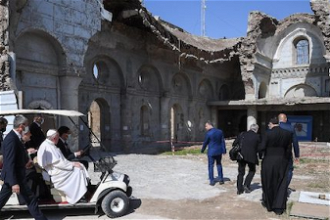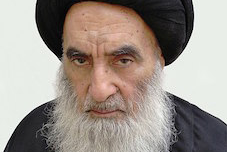Pope in Iraq 7: World is changed by Beatitudes, not power

Source: Vatican News
Pope Francis celebrated the Divine Liturgy with Chaldean Catholics in Saint Joseph's Cathedral in Baghdad on Saturday. During his homily he explained how witnessing to love in the Beatitudes helps fulfil God's promises.
The Holy Father told Iraq's Catholics they are precious in the eyes of God because they witness to the Beatitudes of Jesus in their daily life. He said they are witnesses who, by living the Beatitudes, are helping God fulfil His promises of peace.
The Pope made the observation in the homily during his first public Eucharistic Celebration, called the Divine Liturgy in the Chaldean rite and in other Eastern rites, which he presided over in the evening in Saint Joseph's Chaldean Cathedral in the capital, Baghdad.
The Pope pointed out that the search for wisdom has always attracted men and women. But often those with more means can acquire more knowledge and have greater opportunities, while those who have less are side-lined.
"Such inequality, which has increased in our time," the Pope said, "is unacceptable." However, the Book of Wisdom reverses this logic, when its says, "the lowliest may be pardoned in mercy, but the mighty will be mightily tested." The more powerful are subjected to rigorous scrutiny, while the least are God's privileged ones.
Jesus, who is Wisdom in person, brings about this total reversal with the Beatitudes. The poor, those who mourn, the persecuted are all called blessed.
It is no longer the rich that are great, but the poor in spirit; not those who can impose their will on others, but those who are gentle with all; not those acclaimed by the crowds, but those who show mercy to their brother and sisters.
The Pope explained that the invitation of Jesus to love, which is the heart of the Beatitudes, even if it seems weak in the world's eyes, in fact always triumphs.
On the Cross, love proved stronger than sin, and in the tomb, it vanquished death. It is the same love that made the martyrs victorious in their trials, Pope said, adding that in the last century there have been many more martyrs than in the past.
Love has also been the strength of Iraq's Christians, who have suffered prejudice and indignities, mistreatment and persecutions for the name of Jesus. St Paul emphasizes this point in the second reading of the Divine Liturgy, when he tells the Corinthians, "Love never ends."
"While the power, the glory and the vanity of the world pass away, love remains," the Pope said. The practice of the Beatitudes asks us to become witnesses, day after day, by living meekly, showing mercy and by having a pure heart. "Witness is the way to embody the wisdom of Jesus," the Pope emphasized, adding that the world is changed "not by power and might, but by the Beatitudes."
St Paul further explains how one can bear witness to the love of Jesus. Love seems synonymous with goodness, generosity and good works, yet Paul says that "love is patient."
First and foremost, the Bible speaks of God's patience with men and women who throughout history have been unfaithful, falling into the same old sins, said the Pope. Yet the Lord always remained faithful, forgave and began anew. This patience to begin anew each time is the first quality of love. It does not get discouraged, give up, or surrender, but stays creative and responds to evil with good. God's witnesses, the Pope said, are not passive or fatalistic but are constantly hopeful.
In the face of adversity, the Pope explained, there are always two temptations - either to run away and keep aloof, or react with anger and show force. This was the case of the disciples in Gethsemane when many fled and Peter drew his sword. Yet neither flight nor the sword achieved anything.
Jesus, on the other hand, changed history with the humble power of love, with His patient witness, which is what we are called to do; and this is how God fulfils His promises.
The wisdom of Jesus embodied in the Beatitudes, calls for witness and offers divine promises, such as the kingdom of heaven, comfort, satisfaction or seeing the face of God, which guarantee unrivalled joy and never disappoint.
The Pope said they are fulfilled through our weaknesses and inner poverty, and the Biblical figures, such as Abraham and his wife Sarah, Moses, Our Lady and Peter are proof of this.
The Pope thus urged Iraq's Christians never to give in to feeling helpless and useless, saying "God wants to work wonders precisely through our weaknesses."
In conclusion, Pope Francis thanked God with and for the Christians of Iraq, for the many witnesses "in our own time," who are "often overlooked by the news," yet are "precious in God's eyes." They are "witnesses who, by living the Beatitudes, are helping God to fulfil His promises of peace."
The full text of Pope's Francis' homily in Saint Joseph's Chaldean Cathedral in Baghdad follows:
Today the word of God speaks to us of wisdom, witness and promises.
Wisdom in these lands has been cultivated since ancient times. Indeed the search for wisdom has always attracted men and women. Often, however, those with more means can acquire more knowledge and have greater opportunities, while those who have less are sidelined. Such inequality - which has increased in our time - is unacceptable. The Book of Wisdom surprises us by reversing this perspective. It tells us that "the lowliest may be pardoned in mercy, but the mighty will be mightily tested" (Wis 6:6). In the eyes of the world, those with less are discarded, while those with more are privileged. Not so for God: the more powerful are subjected to rigorous scrutiny, while the least are God's privileged ones.
Jesus, who is Wisdom in person, completes this reversal in the Gospel, and he does so with his very first sermon, with the Beatitudes. The reversal is total: the poor, those who mourn, the persecuted are all called blessed. How is this possible? For the world, it is the rich, the powerful and the famous who are blessed! It is those with wealth and means who count! But not for God: It is no longer the rich that are great, but the poor in spirit; not those who can impose their will on others, but those who are gentle with all. Not those acclaimed by the crowds, but those who show mercy to their brother and sisters. At this point, we may wonder: if I live as Jesus asks, what do I gain? Don't I risk letting others lord it over me? Is Jesus' invitation worthwhile, or a lost cause? That invitation is not worthless, but wise.
Jesus' invitation is wise because love, which is the heart of the Beatitudes, even if it seems weak in the world's eyes, in fact always triumphs. On the cross, it proved stronger than sin, in the tomb, it vanquished death. That same love made the martyrs victorious in their trials - and how many martyrs have there been in the last century, more even than in the past! Love is our strength, the source of strength for those of our brothers and sisters who here too have suffered prejudice and indignities, mistreatment and persecutions for the name of Jesus. Yet while the power, the glory and the vanity of the world pass away, love remains. As the Apostle Paul told us: "Love never ends" (1 Cor 13:8). To live a life shaped by the Beatitudes, then, is to make passing things eternal, to bring heaven to earth.
But how do we practice the Beatitudes? They do not ask us to do extraordinary things, feats beyond our abilities. They ask for daily witness. The blessed are those who live meekly, who show mercy wherever they happen to be, who are pure of heart wherever they live. To be blessed, we do not need to become occasional heroes, but to become witnesses day after day. Witness is the way to embody the wisdom of Jesus. That is how the world is changed: not by power and might, but by the Beatitudes. For that is what Jesus did: he lived to the end what he said from the beginning. Everything depends on bearing witness to the love of Jesus, that same charity which Saint Paul magnificently describes in today's second reading. Let us see how he presents it.
First, Paul says that "love is patient" (v. 4). We were not expecting this adjective. Love seems synonymous with goodness, generosity and good works, yet Paul says that charity is above all patient. The Bible speaks first and foremost of God's patience. Throughout history, men and women proved constantly unfaithful to the covenant with God, falling into the same old sins. Yet instead of growing weary and walking away, the Lord always remained faithful, forgave and began anew. This patience to begin anew each time is the first quality of love, because love is not irritable, but always starts over again. Love does not grow weary and despondent, but always presses ahead. It does not get discouraged, but stays creative. Faced with evil, it does not give up or surrender. Those who love do not close in on themselves when things go wrong, but respond to evil with good, mindful of the triumphant wisdom of the cross. God's witnesses are like that: not passive or fatalistic, at the mercy of happenings, feelings or immediate events. Instead, they are constantly hopeful, because grounded in the love that "bears all things, believes all things, hopes all things, endures all things" (v. 7).
We can ask ourselves: how do we react to situations that are not right? In the face of adversity, there are always two temptations. The first is flight: we can run away, turn our backs, trying to keep aloof from it all. The second is to react with anger, with a show of force. Such was the case of the disciples in Gethsemane: in their bewilderment, many fled and Peter took up the sword. Yet neither flight nor the sword achieved anything. Jesus, on the other hand, changed history. How? With the humble power of love, with his patient witness. This is what we are called to do; and this is how God fulfils his promises.
Promises. The wisdom of Jesus, embodied in the Beatitudes, calls for witness and offers the reward contained in the divine promises. For each Beatitude is immediately followed by a promise: those who practise them will possess the kingdom of heaven, they will be comforted, they will be satisfied, they will see God… (cf. Mt 5: 3-12). God's promises guarantee unrivalled joy and never disappoint. But how are they fulfilled? Through our weaknesses. God makes blessed those who travel the path of their inner poverty to the very end.
This is the way; there is no other. Let us look to the patriarch Abraham. God promised him a great offspring, but he and Sarah are now elderly and childless. Yet it is precisely in their patient and faithful old age that God works wonders and gives them a son. Let us also look to Moses: God promises that he will free the people from slavery, and to do so he asks Moses to speak to Pharaoh. Even though Moses says he is not good with words, it is through his words that God will fulfil his promise. Let us look to Our Lady, who under the Law could not have a child, yet was called to become a mother. And let us look to Peter: he denies the Lord, yet he is the very one that Jesus calls to strengthen his brethren. Dear brothers and sisters, at times we may feel helpless and useless. We should never give in to this, because God wants to work wonders precisely through our weaknesses.
God loves to do that, and tonight, eight times, he has spoken to us the word ţūb'ā [blessed], in order to make us realize that, with him, we truly are "blessed". Of course, we experience trials, and we frequently fall, but let us not forget that, with Jesus, we are blessed. Whatever the world takes from us is nothing compared to the tender and patient love with which the Lord fulfils his promises. Dear sister, dear brother, perhaps when you look at your hands they seem empty, perhaps you feel disheartened and unsatisfied by life. If so, do not be afraid: the Beatitudes are for you. For you who are afflicted, who hunger and thirst for justice, who are persecuted. The Lord promises you that your name is written on his heart, written in heaven!
Today I thank God with you and for you, because here, where wisdom arose in ancient times, so many witnesses have arisen in our own time, often overlooked by the news, yet precious in God's eyes. Witnesses who, by living the Beatitudes, are helping God to fulfil his promises of peace.
Watch the Divine Liturgy on the Vatican Youtube channel: www.youtube.com/watch?v=IaZ529YHlYc


















